#acknowledge the laws and structures of religion
Text
i hate hate when books/movies or wtvr have one random muslim character for no reason other than diversity but the muslim character literally goes against everything islam stands for and the characters doesn’t care at all like acting upon lgbtq desires is a sin or drinking alcohol or dating or believing in multiple high powers okay complex characters i love them but when the character says it’s acceptable evn though it’s not?? just don’t make the characters muslim
and this applies to all religions write religious characters but make sure that the religion is written accurately
ppl do this as well picking and choosing parts of a religions but that’s free will also nobody is ever perfect and nobody follows any religion perfectly but you can’t just ignore what you don’t like you have to acknowledge it but also ppl in real life don’t owe you an explanation and you can’t assume religions
#it’s so annoying#please respect religions#islam#acknowledge the laws and structures of religion#religion
0 notes
Note
“Temple denialism” as a concept, is made up anon and lacks any coherent internal logic. Why do you think the mosque was built there specifically? Randomly? Do you think the muslims who built it, muslims who acknowledge in their holiest book that their religion is a continuation of Judaism and Christianity, were simply unaware of its religious value? That they picked a spot by random? Absolutely 0 Palestinians meaningfully deny that the temple once stood there. What Palestinians deny and refute is the idea that because an ancient structure once stood there prior to al Aqsa, that it is justification enough for the demolition of their cultural heritage and the erosion of their rights that always follows, which is exactly what every Israeli politician who is rhetorically fixated on the Temple Mount explicitly intends to do.
‘Temple denialism’ is a buzzword intended to illicit the familiar emotional reaction one gets when they encounter atrocity denialism by using disingenuous framing to make them appear comparable. Just because you can google it and get results does not make it any less made up. ‘Temple denialism’ as a framework for discussing Palestinian resistance to cultural genocide is a product of the fact that the demolition of al-Aqsa is a cornerstone goal of right-wing Israeli politics and intends to smear Palestinians as bigots for resisting this. It does not describe a real phenomenon that exists.
As I was looking into denialism I realized they only cite like 2 Palestinians, Arafat and the current Palestinian president that no one likes.
Now I'm not sure islamically why they chose that site.... I can't speak to it. Prophet Muhammad is believed to have ascended up to heaven to speak to God from there actually, which is why it's the third holiest site in Islam. I believe that's the reason AlAqsa was built there... but I don't want to say for certain.
But yes you're completely right, it's intended to erode Palestinian nationhood and also militarize the rest of Palestine. For us, AlAqsa is the last symbol of nationhood and you can't deny that if Israelis were allowed in there, it would become a highly militarized zone.
People always bring up the ummayad dynasty as a way to deligitimize Palestinian ties — as if the concept of Palestine started then but that's completely ahistorical. Palestine was a thing BEFORE Islam and arabization even. Palestine has been a concept for millenia (if you read Palestine: a 4000 year history, this discusses this more) and its the intent to enact the final stages of settler colonialism by denying the concept of Palestine through the settlement of AlAqsa. I think it's a shallow analysis to say "what does the ibrahimi mosque have to do with anything" but Ibrahimi mosque is also one of the most important mosques in Islam and now Muslims are barely allowed there. Many believe it's the template for what they want to do in AlAqsa.
There's more but like, it does feel like saying "Well Muslims built AlAqsa on Temple Mount. It's their fault we want to demolish it." But then ignore the fact that most Islamic and Christian places of worship are essentially confiscated from Palestinians and their existence as Palestinians is criminalized even in their own homes, as theyre under threat of being arrested in the middle of the night. And there's not the same level of outrage for basic apartheid laws. In my opinion, you should be more concerned with that than the one place Israelis are not allowed.
130 notes
·
View notes
Note
heya! can u tell me more about liturgy? i want to participate im a nondenominational catholic but i want to be more active in my faith! is it too late to start?
Welcome, beloved!
"Liturgy" comes from Greek and means "public service," and Christians use it generally to mean the order of events/ritual in communal worship, although it can sometimes refer to personal worship, like the liturgy of the hours.. Different denominations range in their formality and structure, but there is a pretty standard order in at least Western churches with traditional liturgies and from what I can tell, Eastern rites have very similar ideas/sections. Encyclopedia Britannica has a pretty good basic history of Christian liturgy, and the Wikipedia page has some good sections/links.
There are liturgies for different times of day and events, but the most common/important Christian one is the service of Holy Communion, practiced every Sunday. This comes from two places I can think of. First, Judaism has the practice of keeping the Sabbath, and the first Christians, being from Jewish communities, already had the ritual of weekly worship, but, partially to differentiate themselves from Jewish law but also as an acknowledgement of the most important event in the Christian faith, the Resurrection, began to meet on Sundays. Second, Jesus at the Last Supper commanded us to "do this in remembrance of me," and Paul tells us that "whenever you eat this bread and drink this cup, you proclaim the Lord's death until he comes." We eat and drink as Jesus taught us, and can see that even in the first generation of Christianity, the holy meal was central.
We worship together because religion is interpersonal, and Jesus did not come simply for us personally, but for us all communally. My response to the missionary's question of "Do you have a personal relationship with Jesus Christ?" would be "No, I have an interpersonal one." (Unlikely my father, who said, "Yes, I eat him.") Obviously there is great diversity of situation/location, and joining a church is not in the cards for every person. But, nonetheless, we must live out our faith with others, whether that's church, family/friend gatherings, interfaith worship, or any kind of community gathering/serving. And I'll say it more later, but no, it's not too late to begin this or move in a new way.
Here is, very generally, the order/content of the liturgy of Holy Communion I know, which I think is almost identical to the Roman Rite:
Confession/absolution: We a general confession of sin, ask God to help us, and the pastor announces God's forgiveness. Private confession is not the norm in Protestant churches, so this where we bring our confessions to mind before God.
Procession/hymn: In my church, the pastor does the confession from the back of the room, and processes, with the assisting minister, acolyte(s), and crucifer, to the altar, while we sing an entrance song.
Kyrie/litany/hymn of praise: We sing petition and praise—the songs/chants change depending on the season.
Prayer of the day/collect: This prayer changes every week and gives the context for our gathering. It references whatever season we're celebrating and sometimes the Bible readings we'll hear.
Scripture readings/lessons: This is generally one reading from the Old Testament and one from the New Testament non-gospel books (Acts/letters/Revelation). The cycle of readings throughout the year follows the seasons and tells overarching stories/themes.
Psalm: The one book we read (or, sing) from every single week is the book of Psalms. In our church, we perform a call and response chant for that week's psalm in between the OT/NT readings.
Gospel verse/acclamation: As the Bible is being brought to the pastor, we usually sing "Alleluia, Lord, to whom shall we go?" including John 6:68-69, but during Lent we sing "Return to the Lord your God" from Joel 2:13.
Gospel: A reading from Matthew, Mark, Luke, or John relating to the season/other readings.
Sermon/homily: The pastor preaches on the readings or season, usually providing further information about them and giving us a lesson to take with us for the week.
Hymn of the day: We sing our second hymn here. This is usually the one most thematically relevant.
Creed: Either the Apostles' or Nicene Creed is recited. This is a weekly affirmation of our shared beliefs, uniting us with every Christian across time and denomination who has said these words.
Prayers of the church: Multiple intercessory prayers are read relating to the season, current events, members of the church, etc. These conclude with a remembrance of the dead, naming those who have recently died and making space for people to call out their own loved ones.
The Peace: Historically, this ritual greeting was the "kiss of peace," but all churches that I've been to have gone for handshakes or hugs instead. I think Catholics do the Peace after Communion, which honestly makes more sense, but this is where it is for us. I have appreciated it recently, as I'm often crying after the remembrance of the dead.
The Offering: The offering plate is passed around while singing, and people are welcome to make donations. These funds go toward paying the pastor and organist, worship supplies, upkeep of the church building/grounds, members in need of support, and donations to charity. After collection, we pray that we will use the money in service of God and our neighbor.
Preface/Eucharistic prayer/Great Thanksgiving: The pastor begins holy communion with a recitation of Jesus's words at the Last Supper, and calls the Spirit to be present in our meal.
The Lord's Prayer: The prayer Jesus himself gave us to pray! Everything we need to say, right there. Maybe we should save time and just do this?
The Communion/Eucharist: We all come forward and receive communion. Churches have varying levels of real bread and wine—we get real wine but little wafers, some places go for grape juice. This is the central act of gathering—we can read the Bible on our own, we can pray on our own, but we cannot share a meal by ourselves. Breaking bread together is the fundamental Christian ritual, however that materially/theologically shows up in our communities.
Songs of thanksgiving/prayers: We give thanks for the meal, and pray that it will sustain us.
Closing hymn: Catholics don't stay for all the verses of this, it seems. I've been the last one singing before—as a visitor. This is my main (loving) critique of y'all's liturgy.
Benediction: (See, we're not allowed to leave because we have to wait for the blessing, however many verses of the hymn there are.) The pastor recites the priestly blessing from Numbers: "The Lord bless you and keep you. The Lord make his face to shine upon you and be gracious to you. The Lord look upon you with favor and give you peace." The assisting minister then sends us with these words: "Go in peace, serve the Lord. Thanks be to God."
I find liturgy really valuable for lots of reasons. Just on a base level, I crave rhythm and ritual. I've said the words my whole life, which means I don't have to know what to say or do, I don't have to get anything right or perform. I meet every week with a group of people who want to say the same words while coming from so many different kinds of lives. We want to tell stories and sing songs together, the same as Christians have since the very beginning, the same as humans have since creation. Every week, I am reminded of what this is all for. It's a kind of reset, and I keep needing it.
It's also a foundation for our community--the church is our gathering space, where we share meals, where we mourn our dead, where we organize, where our children play. The liturgy grounds us in common stories/music, and we take this with us to everything else. Many people who have left the church have said that there's not really an societal equivalent, and I mourn the fact that the church has not been a space for everyone, and that there aren't similar secular spaces. Especially in the sharing of money and time, I've learned really valuable lessons about community from the church.
It is never too late to need this, to join in, to attend a church, to start praying, to get baptized—these things are not age-dependent, and they come to us all differently. The disciples were old and young, the saints have come to God at all different times, and our lives do not all follow the same pattern. There's that joke about how Jesus didn't start his ministry till age 30—but even if you're way past 30, you only need a day in which to live seeking God, and God willing you have many days ahead of you.
Maybe this has been on your mind for a while, and it feels like you've missed your chance—you haven't. Each day we recommit ourselves to life, which means each day we have the opportunity to change it. I have never been to a church that would look down on someone beginning their church participation at any age—even the most annoying conservative churches I can think of love when people start coming.
I don't know what the church options are where you live, but I'd encourage you to visit some! Attending is not a promise to join or keep attending, just a participation in a liturgy. There may be restrictions for taking communion depending on your baptism/membership, but there are no restrictions on coming and listening and singing. And even if just once, you'll have participated in the unfolding story of Christian communal worship, and made it better by being yourself and coming with love.
There are churches who have completely different liturgies/practices—Quaker meetings are a great example. As I mentioned, there are personal liturgies that, while not a replacement for community, can introduce ritual into our homes and keep us faithful us as we seek community (I'm currently practicing Phyllis Trible's Divine Hours). Tradition sustains us, and is continuously being created. Wherever you find your home, whatever songs you sing, may God go with you, and may you never feel it is too late to start absolutely anything.
<3 Johanna
36 notes
·
View notes
Text
What Shamanism Is Not

When people ask me if I can define what shamanism is, I like to begin by defining what it isn't. Sometimes it is easier to contrast something with what it is not than to define exactly what it is. So in that vein, shamanism is not:
Religion. It is important to highlight that shamanism is not a religion, which involves a set of organized beliefs, practices, and systems that most often relate to the belief and worship of a controlling force, such as a personal god or another supernatural being. In an organized religion, belief systems and rituals are systematically arranged and formally established, typically by an official doctrine (or dogma), a hierarchical or bureaucratic leadership structure, and a codification of proper and improper behavior. Unlike religion, shamanism has no dogma, no religious hierarchy, and is a cross-cultural tradition characterized by direct revelation and hands on experience. Shamanism is based on the principle that innate wisdom and guidance can be accessed through the inner senses in ecstatic trance. No intermediary such as the church or priesthood is needed to access personal revelation and spiritual experience. The essence of shamanism is the experience of direct revelation from within. Shamanism is about remembering, exploring, and developing the true self. Shamanism places emphasis on the individual, of breaking free and discovering your own uniqueness in order to bring something new back to the group.
Psychology. Psychology is the scientific study of the mind and behavior. Psychologists endeavor to understand the motivations and intentions inherent within a person's mental and emotional behaviors. It does so by uncovering the hidden agendas and issues at play in a persons actions and choices. Shamanism acknowledges the value of the psychological perspective, however, it does not seek to understand a person's underlying issues and intentions. That is best left to trained psychologists. Indeed, from the shamanic perspective--which is to say a soul-centered perspective, rather than a mental perspective--it is understood that the inner state of the soul is expressed as thoughts, feelings and emotions in the outer, physical realm. The mental and emotional conditions are but the symptoms or manifestation of the inner state of the soul. Shamanism is a paradigm of self-empowerment, which enables people to engage the soul in ways that foster its growth and evolution.
Metaphysics. Metaphysics is the branch of philosophy concerned with the fundamental nature of reality and being. The perspective of metaphysics is that everything has a function or purpose and its essential nature is to grow and achieve its purpose. It explores abstract concepts such as cause and effect (karma), the nature of time, the existence of God, the meaning of life, the relationship between mind and body, and the existence of free will. Unlike metaphysics, shamanism is based in personal accountability without the imposition of an all-powerful God or theoretical universal laws that dictate the circumstances of our lives. Shamanism is premised on spiritual sovereignty free of karmic reward and punishment. When presented with a situation, shamanism never endeavors to find what the lesson is, understand its purpose, or comprehend the meaning. Instead, practitioners seek to apply their knowledge and skills to resolve the situation. Practitioners employ time-tested methods for altering consciousness to find clarity and solve problems.
What Shamanism Is
Shamanism is a cross-cultural, spiritual path practiced in every continent of the world. It is the most ancient and most enduring spiritual tradition known to humanity. It predates and constitutes the foundation of all known religions, psychologies and philosophies. It originated among nomadic hunting and gathering societies. These ancient shamanic ways have withstood the tests of time, varying little from culture to culture. Over thousands of years of trial and error, primal peoples the world over developed the same basic principles and techniques of shamanic power and healing.
Shamanism represents a universal conceptual framework found among Indigenous tribal humans. It includes the belief that the natural world has two aspects: ordinary everyday awareness, formed by our habitual behaviors, patterns of belief, social norms, and cultural conditioning, and a second non-ordinary awareness accessed through altered states, or ecstatic trance, induced by shamanic practices such as repetitive drumming. The act of entering an ecstatic trance state is called the soul flight or shamanic journey, and it allows the journeyer to view life and life's problems from a detached, spiritual perspective, not easily achieved in a state of ordinary consciousness.
The shamanic practitioner traverses the inner realms in order to mediate between the needs of the spirit world and those of the material world. It is an inward spiritual journey of rapture in which the practitioner interacts with the inner spirit world, thereby influencing the outer material world. From a shamanic perspective, all human experience is self-generated. Experience is shaped from within since the inner world is a microcosm of the outer world. Each human being is a hologram of the universe. Essentially, we are the universe experiencing itself in human form.
#shamanism#consciousness#shaman#shamanic drumming#shamanic practice#shamanic journey#shamans#spirituality
44 notes
·
View notes
Text
javert is WRONG: the thesis of les mis is that legality and morality aren't synonymous!
i just found the internet's most unbelieveably dogshit hottake that makes anything woobifying javert written by Die Girlies Auf Tumblr Und Twitter galaxy brained in comparison. rest is below a cut because i got Wordy in my goal of ripping this motherfucker a new one.
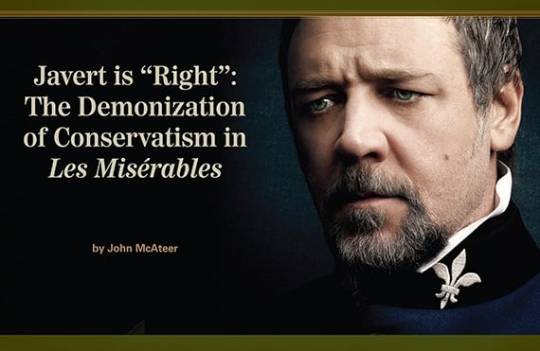
The point about “fault” is very important here. Following Rousseau, Hugo believes that the poor become criminals out of necessity. They “fall” (i.e., become poor) and then become morally “degraded.” Therefore, our response to crime should be “charity,” not punishment. This is a classic Romantic view that became the basis for modern liberalism. According to Rousseau, people are basically good and are corrupted by society, committing crime only out of ignorance and desperation; the solution to crime, then, is education and welfare. Christians obviously worry that this view has no place for the doctrine of original sin, and conservatives object to this view because it leaves out personal responsibility for crime.
i know this is a christian publication but the concept of original sin even factoring into criminality and criminal justice genuinely pisses me off. stop forcing your shitty worldview that everyone is popped outta the womb an evil sinner, i beg. the seperation of church and state is a vital part of democracy. also, you can believe people are shaped by society and driven to crime through desperation without taking away personal agency. those two things are not contradictory.
If I am right about the Rousseau subtext, then Javert is not necessarily a villain; he’s just a conservative, albeit a liberal caricature of a conservative. There are two good examples of a liberal bias in Les Mis. First, notice that Valjean’s position in his society is roughly analogous to an illegal immigrant in our society. When he leaves the prison, Valjean can’t get work because he doesn’t have the right papers. He’s an undocumented worker. In a scene from the musical cut from the film, a farmer allows Valjean to work for him, but then only pays him half as much as the other laborers. The farmer reasons, “You broke the law….Why should you get the same as honest men?”
i've never seen anyone, even javert fans, try and argue he isn't a villain. this is breaking new ground here, folks. it's a hell of an assertion, but it's demonstrably false. jean valjean is the main character. we root for him and wish to see him succeed. javert is hunting him for the entire narrative. thus, he is the antagonist. there may be some moral ambiguity on both their parts, but he structurally is the villain and that is a narrative fact.
next, as an american i am fucking BEGGING on my HANDS and KNEES for other americans to learn about the differing political terms for different countries and times if they are speaking about them with any supposed credibility. i'm not asking you to memorize every country's parties and political intricacies, but at least acknowledge that even if there is some overlap between 21st century american conservatism and 19th century french politics, that there is no one-to-one analogy!! modern american christian conservatism is a consequence of hundreds of years of unique geopolitics and religion stewing together, and you can say similar things about french politics of the time! you CANNOT just say shit like "javert is a liberal caricature of a conservative" without sounding like an utter clown because hugo was not an american liberal and javert is not an american conservative. now, if you were to alter your language a bit and say something like "javert is a leftist caricature of an arch-conservative," you'd sound less foolish (hugo's politics are hard to pin down but leftist is i believe the best label for him at the time of LM's publication. and to my understanding javert isn't really a fervent arch-conservative but it is at least a plausible reading bc he's a traditionalist, deeply religious cop and 19th century french arch-conservativism actually existed in 19th century france (shocker, i know!)). but that change in language would require actual intellect and effort to learn about other times, places, and worldviews on the part of the author, and judging by his ignorant politics, something tells me he's lacking that!
then there's the bit about illegal immigration. hoo BOY is this fucking stupid. jean valjean is a white, culturally catholic, working class french male citizen. he's an everyman of the time, his name and story of class struggle couldn't be more generic unless he was named john doe or jean dupont (the french equivalent) from nowheresville, france. hugo had a point here, and that is that as a member of the wretched poor, les misérables, valjean, representing a large swath of the french populace, is so removed from education and self reflection and truly living life that he's more akin to an animal or an object, that he's so beat down by the daily grind that he verges on inhuman. this is only magnified by his time in toulon. i'll stop there, but it is very important in jean valjean's story that he's impoverished, yes, but a french citizen. he is as french as the king, but treated like dirt because of his social status and criminal record. this sets up a dichotomy in the france of 1832 between the wretched poor and those with privilege, which is an important part of the novel.
the issue of "illegal immigration" both in france and america is a modern one. there was still bigotry and xenophobia, obviously, but the discourse around the intersections of border control, the nation state, and citizenship is a very modern one. to say "valjean's position in his society is roughly analogous to an illegal immigrant in our society" is ignorant. yes, both jean valjean and many undocumented immigrants are faced with similar abuses, but that does not mean it's intended by hugo to be a reading of the text or political commentary because let me restate this: 21ST CENTURY AMERICAN POLITICS DIDN'T EXIST IN 19TH CENTURY FRANCE!
also, valjean is the opposite of undocumented. he has his yellow papers, which are quite literally documents that are the root cause of the daily discrimination he faces, hence why him ripping them up is a radical act of freeing himself from the control of an unjust state. i don't even know how you miss this, it's stressed in the movie musical multiple times.
“Men like you can never change,” he tells Valjean. But Javert is not simply being prejudiced here. He knows from his own experience that it is possible for the poor to pull themselves up by their bootstraps. Javert, too, was born in poverty. He is “from the gutter,” as he puts it, but he embraced law and made something of himself.
oh, of course the bootstraps ideology rears its ugly head. not even gonna waste my breath on this one other than to call it stupid and wrong. all javert made himself was a class traitor and a bootlicker, and that's honestly tragic.
Consider a second example of liberal bias. The character of Fantine is designed to elicit the viewer’s sympathy for “welfare mothers.” Fantine, a young, unwed mother in Valjean’s factory, faces persecution from her coworkers. The factory foreman expresses a conservative attitude toward charity: “At the end of the day, you get nothing for nothing.”
this part. this part was so unbelievably cruel and so far removed from the empathy that this narrative bleeds that i had to step back from writing this and take a smoke break. firstly, fantine is NOT a stand in for "welfare mothers", which is, once again, a modern conservative strawman! the welfare state did not exist in 19th century france. there was little to no support for mothers in fantine's position, and to my knowledge, none stemming from the state. hugo was writing her character to bring to light the unfairness of her position. she had a lover who left her flat out, with a child to care for and no financial support. she was ostracized, eventually fired, and resorted to survival sex work.
Fantine shouldn’t expect special treatment, but rather should take responsibility for the consequences of her own sexual license.
fuck you, john. where in the text did she ask for "special treatment". where in the text did she do ANYTHING but take responsibility for her child. she sold her hair. she sold her teeth. she sold her body. she got sick because of her living conditions. she died. all out of love for her child. also, framing children as "a consequence" is disgusting, and you should be ashamed of yourself and reflect on why you think that's an alright way to view a living, breathing, human being. if you don't wanna take my word for it, psalm 127:3 clearly states "children are a gift from the lord; they are a reward from him," so your stance is decidedly unbiblical. children aren't punishment.
Likewise, when Fantine turns to prostitution to feed her child, Javert is unmoved by excuses. Valjean’s family was starving, and Fantine’s daughter was sick, but these facts don’t excuse them for breaking the law. Theft and prostitution are wrong, and it is Javert’s duty as police officer to arrest them.
how is theft to feed a starving child immoral. how is sex work to ensure your child lives immoral. give me ONE reason aside from your and javert's religious worldviews that either of those things is wrong. "but the bread didn't belong to valjean!" and would inaction, watching his nephew die simply because a windowpane and empty pockets separated him from a piece of bread be more moral? is watching a child die when you believe you can save them the better option? the whole point of this damn book is that legality is NOT synonymous with morality. javert may have the legal high ground, but he does NOT have the moral high ground, and when he realizes this, the thesis of the book, he fucking kills himself! for an example outside the text to perhaps get it through your thick skull: slavery was legal. biblical, even! does that mean it's morally right? no!
Thus Les Mis is designed to get us to see Javert’s conservatism as cruel and to elicit sympathy for Hugo’s liberal social policies. It should be noted, however, that Les Mis is a caricature of the conservative position. Conservatives agree that we ought to treat the poor with dignity and compassion. They think that compassion programs, however, should be administered by the church instead of the state, and they think true dignity requires personal responsibility and submission to the law.
how can javert both be an exaggerated, cruel conservative caricature and be right? i'd argue he's both an accurate portrayal of the inherent cruelty and misanthropy present in the politics of the political right, and that he's decidedly wrong as proven in the text. jean valjean is a good man, despite it all, but javert couldn't see that because of his worldview and chose to relentlessly hound him until he finally realized his mistake, a realization that overcame him so strongly that his only solution in his mind was to kill himself!
and do conservatives actually agree they should treat the poor with dignity and respect? it's in the bible, sure, which christian conservatives hold as the absolute truth, but in this very article you, a christian conservative, have expressed nothing but contempt and cruelty for undocumented immigrants, for unwed mothers, for thieves and sex workers. for les misérables - the wretched poor. and why shouldn't the state handle "compassion programs" as you call them? the gov't is electable and manageable (in theory), unlike the beast of untraceable wealth and power that is the church. we don't live in a theocracy, so the only reliable way to ensure people get the help they deserve is through the state, which can actually be held accountable for these expectations (again, in theory). that's more than you can say for the church.
The fact that Les Mis contradicts evangelical theology does not mean apologists shouldn’t use it—on the contrary. We can help non-Christian fans of the musical see how the vision that draws them toward the story can only be fulfilled in Christ.
his conculsion is LAUGHABLE. personally, the "vision that drew me to the story" at age twelve was my attraction to men. i'm a flaming homosexual, you see, and a transgender one at that. the overwhelming majority of musical theater fans i've encountered are some variety of queer. at age 22, ten years later, i'm drawn to the story still partially because i find these characters attractive and magnetic, but much more so for the literary and socialist political value i find in the narrative. i'm an unrepentant leftist as well, as are literally every other les mis fan i've ever met (besides yourself, of course). i've found more fulfillment through reading les misérables than i have in my exploration of the new testament, and i'm not even done with the book yet!
i don't really know how to conclude this other to point and laugh at john and his publictaion, because somehow i stumbled upon a conservative fan of les mis and the lack of self awareness is more baffling than i could have ever imagined it being
#len's meta#les mis#les mis meta#les miserables#les misérables#les miserables meta#les misérables meta#javert#javert meta#god this took forever to write up bc i had to keep taking mental health breaks. it ticked me off THAT much
75 notes
·
View notes
Note
TW: Discussions of incest within Warrior Cats.
I’m SO sorry if I unintentionally cause toxic drama and/or discourse within the fandom by making this confession. But-
I honestly dislike that they’re some parts of the wc fandom that (highly) excuse, and/or possibly even justify the amount and/or portrayal of INCEST within warrior cats.
They’re quite a couple bunch of relationships with incest in warrior cats, including:
Sparkpelt and Larksong: They are third cousins.
Heathertail and Breezepelt: They are second cousins
Lilyheart and Snowbush: They are first cousins and are foster siblings within the series.
Hawking and Pebbleshine: They are first cousins.
Due to the fact that Cherrytail - Hawkwing’s mom - and Sparrowpelt - Pebbleshine’s father - are siblings, which is expressed to be true within the super edition Firestar’s Quest.
And Ivypool and Fernsong: They are second cousins.
This pairing feels quite a bit more irritating and/or icky to me, due to the fact that THE main prophecy within OoTs centers around the fact that Dovewing, Lionblaze, and Jayfeather being related to eachother within the series.
With Ivypool being SISTERS with Dovewing, and how that and Dovewing being within the prophecy MAJORLY affect Ivypool’s character and/or Arc, and with Lionblaze being Fernsong FATHER.
So the fact that they’re together despite the fact that they’re directly related to cats whose bloodline being connected is a rather major part of the center plot of the fourth arc…I suppose kind of adds a bit of salt to the wound.
They’re probably a few other incest relationships within the series as well, but I decided to chose these five relationships specifically, due to the fact they play a bit of a major part in the series and/or are that closely related to each other.
Of course, I do understand why people ship these cats together, regardless of their….close relations to one another.
I get why people ship Fernsong and Ivypool, because of how cute and/or wholesome it may be.
I get why people ship Sparkpelt and Larksong, due to them probably having a sweet relationship that has a rather tragic end, due to Larksong’s death.
I get why people ship Hawkwing and Pebbleshine, due to the fact that their relationship plays quite an important part within Hawkwing’s life in his super edition.
I get why people ship Breezepelt and Heathertail, due to the fact that they like their relationship in Crowfeather’s Trial.
And I get why people may ship Lilyheart and Snowbush, due to the fact that they’re background characters, so people may gave forgotten and/or not pay very much attention to them (and the fact that they’re related).
And I do understand that the Erins pairing cats who are related to each other is COMPLETELY (or at the very least, the majority of the time) unintentional on their part, especially since there’s a shitload of family trees within warrior cats that need to be tracked and/or looked at before making pairing characters together.
But while this is true, it does NOT excuse the fact that these characters, are, indeed, CANONICALLY related, regardless if the authors pairing cats that are RELATED to each other is intentional on their part or not.
I suppose if people do decide to ship these characters together within the series, they should NOT excuse and/or justify the fact that they’re related to each other, and acknowledge that their ship is, indeed, quite problematic because of the incest in it, regardless if it’s intentional by the authors or not.
Also, the authors probably unintentionally writing relationships with incest within the series does NOT excuse the fact that incest is indeed, a reoccurring and possibly even normalized icky and problematic part within Warrior Cats.
Some people may say:
“But they’re cats!”
These characters are mentally anthropomorphic characters within the series that having human thoughts, emotions, behaviors, and beliefs, as well as their own complex rankings, laws, structures, and religion. An author of the series literally called the characters something similar to “little furry humans with paws”.
Or say:
“But the characters don’t care about it.”
Or even:
“The number 1. part of the code encourages cats to NOT mate with cats of other clans, so technically all of them are related, so it’s ok!”
Um, no, it’s freaking NOT? The fact that these characters live in a society and/or with a code that probably results in the MAJORITY of the characters within the clans related to each other in some shape or form, makes the problem of incest within the series even WROSER.
Because of the fact that underneath the surface, this part and/or problem in the books results in the problem within the series to be quite NORMALIZED within the books, regardless if it’s unintentional by the authors or not.
If you write a series with multiple family trees, and want to pair certain characters together, you should make sure to put quality care and/or time check if they’re (closely) related to each other in any way before making them become lovers within the series.
Which is something that the authors unfortunately didn’t do, possibly because they’re, well…the Erins, who at times don’t put much care and/or research into certain things they’re writing within the series *cough*Shadowsight’s medical treatment of his seizures*cough*-
Or - more likely so - they weren’t physically and/or mentally able to keep track of the amount of family trees that they created and/or developed.
And while this does explain the problem of incest within the series, it does NOT excuse and/or justify it at all, whatsoever.
I’m SO sorry if it didn’t word this rant properly and that there’s some typos and/or spelling errors within this confession, this took me around hour or more to type into here.
I’m also sorry if I’m yapping too much about this and/or possibly maybe even making this problem look bigger than it actually is, this a something that’s been on my mind for a bit so I wanted to make a rant about it.
If people want to debate the information within this confession, please do your best to communicate about in a hopefully educational and/or civil manner.
I know that maybe hard for some people, considering the subject matter within this confession and there possibly being some toxicity within the fandom, but if you do debate about this confession in this manner, you’re message will probably be more heard or at least tolerated by people who maybe hesitant and/or critical of your point of view.
Thank you so much for taking your time to read this very long rant I made.
Sources from the Warrior Cats wiki:
Sparkpelt’s Family Tree. (Lilyheart and Snowbush, Sparkpelt’s second cousins, are Larksong’s parents): https://warriors.fandom.com/wiki/Sparkpelt/Family
Heathertail’s Wiki Page (See “Kin”): https://warriors.fandom.com/wiki/Heathertail?so=search
Snowbush’s Family Tree: https://warriors.fandom.com/wiki/Snowbush/Family
Hawkwing’s Family Tree: https://warriors.fandom.com/wiki/Hawkwing/Family
Ivypool’s Family Tree: https://warriors.fandom.com/wiki/Ivypool/Family
ㅤ
23 notes
·
View notes
Text
A Thing Of Vikings Chapter 151: Determination

Chapter 151: Determination
Our faith is one of conflict. We are a religion of war. We view existence itself as conflict, that of order versus not just chaos, but nihilism itself. We view our lives as bubbles of structure clawed out of a meaningless, pointless reality, hewn together with law and order that will collapse should we act unquestioningly in accordance with our chaotic natures. For we know what happens if we succumb to those base urges and unquestioning reactions: Ragnarök, where all we have striven for, all we have built, will collapse and be purged under the onslaught of disorder. That, ultimately, nothing we have done has lasting meaning, that our legacies will amount to naught.
So we fight against that end. We stop the unstoppable. We question ourselves and our actions, to see their endings. The All-Father saw, but he never reflected on what he saw. He merely reacted, and in that reaction, set forth the sequence of his own destruction. But the lesson we take from this is that it is possible to step back from the precipice and interrupt the chain of events, by choosing a different path.
The followers of the Æsir are at war. But while the Jötnar are all around us, they are not the enemy, even as they are the agents of our potential destruction. No, the enemy is within ourselves. For, unlike the Jötnar, we of Midgard have choice. We can use that choice for good or ill, but to abandon it in favor of unthinking reaction reduces us to little more than an animal or Jotunn, a predictable force in the tapestry whose thread is controlled.
The Weavers care not for the threads. When the Tapestry is complete, they will begin anew. But for us and for those we follow, every inch woven is another victory, every day that we stave off the final knot a battle won.
This is our existence. It is not for everyone. Other faiths view things differently. That is their choice. Their threads still weave through reality, even if they care not to acknowledge it, or view it in different ways—as the Christians view themselves in the service of a Father-God of Order in a conflict against a corruptive god of destruction, or as the Jews view themselves as being in an agreement with a God of Wisdom, helping build upon an imperfect creation. That is their choice, to view things in such a way. But as for us, we will safeguard our own choices, and theirs, knowing that it could all fall to naught. This is our struggle, our burden, our exultation.
Who is with me!?
—Fyrir Hiccup House Haddock VI, Collected Public Sermons & Private Contemplations
AO3 Chapter Link
~~~
My Original Fiction | Original Fiction Patreon
17 notes
·
View notes
Text
Satanic Panic
I saw a post about Satanic Panic, so I felt the need to write an overview of what actually happened for those who don’t know.
What is Satanic Panic?
Satanic Panic can be viewed as either part of the Memory Wars or as an entirely separate entity. If viewed as aligned with the False Memory movement, it might be seen as proof of False Memories and a near complete lack of the existence of ritual abuse. The other takes Satanic Panic as still harmful, but removes the blame from those claiming to have experienced it.
I believe that a crucial part of enabling healing is giving survivors the benefit of the doubt. People who are speaking out about abuse might be doing so for the first time, and are particularly vulnerable to disbelief even if they have told their story before. Talking about maltreatment takes a lot of courage, especially when a stigma already exists around the topic.
Fundie Satanism
That said, the Satanic Panic was weaponized by Christian groups expecting to gain power from it. Some genuinely believed Satanic Ritual Abuse was a primary concern, others knew it was only a face for the politics.
Fundamentalist groups wanted to have the kind of attention they were no longer getting, and the instatement of mandated reporter laws and influx of unsupervised children gave them a fighting cause. They saw that child abuse was becoming popular in media, and they used it as leverage to frighten well-meaning folks into their way of thinking.
Satanic was the word for non-Christian, and Christians were quick to disown anything that hinted at rot within their own organization. Christianity was still popular, and nobody wanted to believe they could be involved with a group that caused harm. So they took any religious abuse, and some non-religious abuses, and slapped Satanic on it.
Satanic Ritual Abuse
Ritual abuse refers to maltreatment that is both standardized and associated with symbols or ideologies. At the time, many kinds of organized (involving multiple perpetrators and victims) and/or coercive (intentionally manipulative) abuse were grouped under that name. Extreme abuse was also called ritual abuse, and we still don’t have a solid definition for that one.
Given that all ritual abuse would have been considered Satanic, fundies basically screwed over anyone who was abused in this specific way. Ritual abuse as we know it now did and does happen. An abuser doesn’t have to believe in their symbolism or ideology to misuse it, and many forms of religion and other structured beliefs can be applied to hurt and intimidate people.
RAMCOA
Ritual Abuse, Mind Control, and Organized Abuse are grouped together under a metric ton of buzz words. The survivors of this collection of abuses are left with research that is out of date, chock full of misinformation, and unable to communicate with people outside of the community.
I know the words are conspiratorial. I get that the books have fear-mongering content. I need people to understand that there is no better option, and pretending bad things don’t happen doesn’t make them go away.
Government Mind Control
Mind control is manipulation with intent. Coercion. Using psychology to get your way. Implanting false memories would be mind control. Again, it doesn’t sound good because cultural contexts have evolved over time and clinical language for this kind of abuse has not. Not all mind control is abusive at all. McDonald’s using targeted ads is mind control. But also training children like dogs is mind control.
There have been government-sponsored projects on mind control. There probably still are. Governments do sketchy things like that for military advancement and because they don’t face consequences, and there was a time where government employees admitted to it. Similar to McDonald’s and their hot coffee campaign, there were some strategic moves to look better to newcomers.
The government has sponsored lots of things they don’t want to acknowledge, and people are still suffering the effects. People in poverty, black and brown communities, and so on can probably agree that government is not synonymous with benevolent.
One of the things the government did was talk to criminal organizations. I don’t know if this is news to anyone, but it was a good way to get information and resources. There were wartime experiments on drugs and interrogation, and those were mind control.
Enough survivors agree about their experiences that it doesn’t seem worthwhile to dismiss them, so until there’s better information we would do well to try to understand them. You don’t have to agree full heartedly to sit with people in their own stories.
Cult Mind Control
I would describe a cult as any group that uses unhealthy practices as a defining feature of their cultural norms. Not everyone agrees on what is or isn’t a cult, and that mostly fine. This is the definition I’m using because it makes the most sense to me in context.
Cults members are not the only ones to use or receive mind control tactics, but the post I saw mentions cults this way. The specific technique is called Trauma Based Mind Control, which is the application of psychological responses to danger and overwhelm for the purposes of an abuser.
TBMC is the primary method for what the RAMCOA survivor community calls programming. Programming is the use of cues associated with PTSD triggers to achieve a desired response in a subject. When programming is done to a small child (under age 6-12, depending on the source), a common response is Dissociative Identity Disorder.
HC-DID
Abusers create alternate self-states within one body to react to the cues given. Depending on how knowledgeable the perpetrator(s) is/are, a child might have a very structured system of alters with little control allocated to them. These systems are designed by and for abusers to create long term obedient subjects.
Not every DID system is formed this way. Most are naturally developed with the induction of trauma in a child’s life. Some organic systems have complex structures anyway, but not for anyone but themselves. These systems are polyfragmented, or C-DID systems.
The level of control and organization found within a programmed system is almost always more than those found in organic systems. In the RAMCOA community, this is called HC-DID. The key difference isn’t true complexity, but the type of prerequisites to qualify.
Highly Complex DID isn’t particularly difficult to groom in a child, but it does require intent. Cult groups, as well as other high control groups, are quite capable of figuring it out by sheer cruelty and observation.
Why Does It Matter?
Making blanket statements about what abuse is and isn’t real doesn’t actually help anyone. While people prone to worry who didn’t experience RAMCOA might feel temporarily safer, it’s likely they’ll figure out they were lied to.
People who did experience it struggle with doubt and disbelief from others, and may have been told that nobody would care. This field is still considered taboo, and there are victims of torture and adjacent who are ashamed or afraid because of the state of the larger population.
I survived RAMCOA. My family and friends survived RAMCOA. Not all of my friends survived RAMCOA. Watch yourself.
#did osdd#dissociative identity disorder#traumagenic system#actuallydid#ramcoa#tw ramcoa#did system#polyfragmented system#osddid#satanic panic#satanic ritual abuse#child abuse#tw child abuse#sysblr#system stuff#ritual abuse
34 notes
·
View notes
Text
THEOLOGY
ABRAHAMIC RELIGIONS ->
THE THREE MAJOR ABRAHAMIC RELIGIONS are, in order of appearance, JUDAISM, CHRISTIANITY, and ISLAM, but there are other MINOR RELIGIONS.
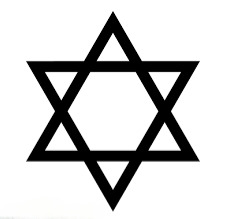
■JUDAISM is an Abrahamic monotheistic religion based on the covenant shared between God and Abraham.
The holy scriptures of JUDAISM are called the TANAKH, after the first letters of its three parts in the Jewish tradition. T: TORAH, the Teaching of Moses, the first five books. N: NEVI'IM, the books of the prophets. KH: KETUVIM, for the Writings, which include the psalms and literature for the wise.
ORTHODOX JUDAISM is the belief in a strict interpretation of Jewish law, which should be grounded in the Torah. As such, the revelation given to Moses from God on Mount Sinai is made glorious and just.
CONSERVATIVE JUDAISM is the belief in marriage and membership as a Jew. Other characteristics will include support of the Zionist movement and the rejection of the immutability of the "Torah" and the "Talmud" while still having faith in the eternal truth upon which it is based.
REFORM JUDAISM is the belief of the renewal in our living Covenant with God, the people of Israel, humankind, and the earth by acknowledging the holiness present throughout creation – in ourself, in each other, and in the world at large – through practice that will include reflection, study, worship, ritual, and much more.

■CHRISTIANITY is an Abrahamic monotheistic religion centered around the birth, life, death and resurrection of Jesus Christ.
THE BIBLE is the holy scripture of the Christian religion, purporting to tell the history of the Earth from its earliest creation to the spread of Christianity in the first century A.D. Both the Old Testament and the New Testament have undergone changes over the centuries.
□ROMAN CATHOLICISM
Roman catholicism is a branch of Christianity which has its belief about the sacraments, the role of the Bible and tradition, the importance of the Virgin Mary and the saints, and the papacy.
HISTORY OF THE REFORMATION
THE REFORMATION was a reform movement in religious belief that swept through Europe in the 16th century. It caused the creation of a branch of Christianity called PROTESTANTISM, a name used collectively to refer to the many religious groups that separated from the Roman Catholic Church due to their difference in doctrine.
□PROTESTANTISM
Protestantism is a branch of Christianity which will deny the universal authority of the Pope and affirm all of the Reformation principles of justification by faith alone, the priesthood available to any practitioner, and the Bible as the only source of revealed truth.
□QUAKERISM
Quakerism is a branch of Protestantism
Follow your "inner light"
The Bible
Equality for all
God is accessible to everyone
No clergy
No religious ceremonies
No sacraments
LOCATION -> England
WHEN -> 17th Century
Adventism
Anglicanism
Anabaptism
Baptism
Irvingianism
Lutheranism
Methodism
Moravianism
Pentecostalism
Waldensianism
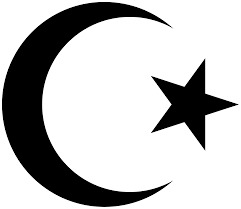
■ISLAM is an Abrahamic monotheistic religion that was revealed to Muhammad, a prophet of Allah, and written down in the Qur'an years later by his followers.
SUNNI
Muhammad did not specifically appoint a successor to lead the Ummah before his death. This sect did, however, approve of the private election of the first companion, Abū Bakr. In addition to the previous mentioned, Umar ibn al-Khaṭṭāb, ʿUthmān ibn ʿAffān, and ʿAlī ibn Abī Ṭālib are also accepted as al-Khulafāʾ ur-Rāshidūn. After this, they believe that Muhammad intended that the Muslim community choose a successor, or caliph, by consensus. A practitioner of this sect will base their religion on the Quran and the Sunnah as understood by the majority of the community under the structure of the four schools of thought. These are HANAFI, MALIKI, SHAFI'I and the HANBALI.
SHI'A
Muhammad's family, the Ahl al-Bayt, including all of his descendants, have distinguished spiritual and political authority over the community. It is believed that Alī ibn Abī Ṭālib was the first of these descendants and the rightful successor to Muhammad. As a result, it was rejected that the first three Rāshidūn caliphs have legitimacy.
------------------------------------------
ETHICAL RELIGIONS ->
THE THREE MAJOR ETHICAL RELIGIONS are BUDDHISM, TAOISM, AND CONFUCIANISM.
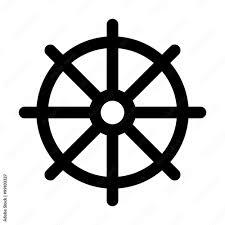
■BUDDHISM is an ethical religion that was revealed by Siddhartha Gautama for anyone to gain spiritual enlightenment if that person followed the eight-folded path along with a personal commitment to any noble truth given to him/her through the journey of life in order to reach nirvana.
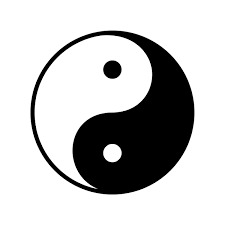
■TAOISM
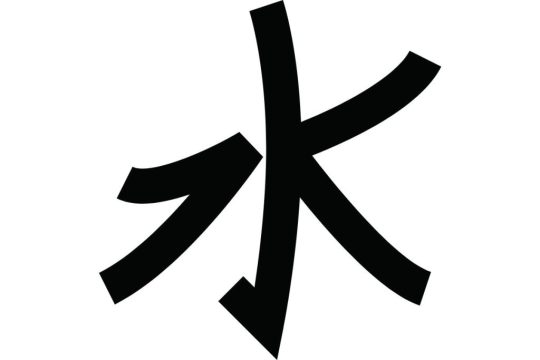
■CONFUCIANISM
15 notes
·
View notes
Text
This is part of a longer post that I've been composing in my head for months, but I've been watching a lot of anti-multilevel marketing (MLM) videos and it had started making me think about how, just like my mom has used religion to cope with her (previously undiagnosed) ptsd, she used MLMs also.
She sold Tupperware and got the Sea World convention trip. She sold Mary Kay and got the car. She sold other things I can't remember-- vitamin stuff, and was super into it.
And the way some people break down the MLMs in the videos I'm watching, really made me think about how that structure of having to constantly recruit new people is so much like evangelism in general, but particularly Jehovah's Witnesses. They are constantly trying to recruit you -- not just to save you, or teach you something they say will enrich your life, but because they have to make their quotas!
And now I'm watching these ex-JW vids, from Elders who have left the Jehovah's Witnesses, and it's bringing up a lot of memories, but also I'm getting even more of a peek behind the curtain of what goes on in the upper levels... it really is set up like an MLM corporation.
And if you're good at making those quotas, you'll probably thrive. My mom was always good at making her quotas -- both in MLM sales AND her monthly field service (proselytizing) hours. All aspects considered, she was a "better" JW than my father. She was always a joy to the congregation and everyone wanted her involved in things, she sewed the dresses for so many weddings, she sang out in meetings, and she was a zealous Pioneer who always made her quotas and brought new people in. She learned ASL to minister to one person in her territory, and ASL became a passion that led to her going to college once she was out of the JWs.
It's kinda hilarious to me that they lost a truly devoted JW when they disfellowshipped her because she wanted a divorce. 👀 (She had to break a religious law for her divorce to be recognized by the congregation, because dad being abusive wasn't enough-- because of their "two witness" rule about proving guilt. So she had an affair with a coworker, and let people find out about it, and then refused reconciliation in the prescribed Elder marriage counseling.)
When someone is disfellowshipped, they are fully shunned. Baptized people and full members of the congregation aren't allowed to speak to them or even acknowledge them. But my mom at first wanted to earn her way back in!! For which, she needed to stay devout and keep going to meetings, even though she wasn't allowed to sing or do service anymore or talk to any of her friends. And every 6 months or so, she could write a letter to the Elders and the Organization about why she should be reinstated. I overheard these things laid out to her when I snuck downstairs to listen in on their counsel. It was such a scary feeling, compared to the excitement of weeks earlier when my brother and I sat in my room listening to my parents fight about her affair, both of us crossing our fingers and whispering, "Please get a divorce."
Idk if this is where I lost my faith exactly, because even though I was raised in it I had ALWAYS questioned things that didn't make sense and got in trouble for it. But I also DID believe in the religion still-- I was 9/10 and didn't yet realize how that religion had actually been CREATED by men just the same way as Mormonism and all the other sects JWs decry. I just really started labeling them all as hypocrites at that point. The way everyone abandoned my mom, and acted like my dad was so betrayed and perfect; the way they TALKED about my mom and compared me to her all the time to keep my behavior in line. The way they would still talk to me, but not my mom. When she was right there.
...I intended this to just be short and get my thoughts out but I just kept going. Lol I'm stopping here.
But this is the video I was watching when I had to pause and type this lol.
#anti JW#ex JW#anti mlm#(as in multilevel marketing)#cults#religious trauma#my memoir#ish#podcasts#ex-cult
11 notes
·
View notes
Text
Draco Malfoy - Part I
————————————————————
G'Day
This is the opener to Draco Malfoy's birth chart interpretation.
If ya lost, follow this link.

1H Libra Ascendant
The ascendant is very important in astrology, as it determines how the houses are set on the natal chart. This is determined by your time and place of birth.
The Ascendant is your physical appearance, your first impression on people and your identity (not to be confused with personality).
I mentioned earlier in Draco's master list, that I found a time/ascendant that I believe fits Draco most. I feel Libra matches him well, he is perceived as charming, vain and intelligent, to the general school public anyway.
With a Libra Ascendant, Draco is very charming from first impression. He is seen as knowledgable, intelligent, well mannered and a little restless.
Venus is the ruler of Libra which greatly aids Draco's appearance. As Venus is the planet of love and beauty, most would agree that he is handsome, charismatic, attractive and has a great sense of style.
Draco's facial structure will likely be symmetrical with full cheeks, almond shaped eyes, an attractive smile and great hair. His aura will be enticing and depending aspects and other placements, his overall personality could aid to his appearance.
Remember, depending the degree of the Ascendant, Draco may have differing physical appearances from the above.
Harry wasn't fazed by Draco's charming exterior, he could see past that and actually listen to and watch how Draco speaks and behaves. This would come down to aspects to the ascendant and Draco's Mercury placement.
Draco will likely be tall with strength, clean shaven always neatly dressed. He knows he's attractive and he's owning it. This can come across as being vain and egotistical, and may turn people off.
Under Libra, Draco will have a focus on law, justice and truth. He will search for peace and look to bring justice and vindication for those who mean most to him. He is loyal to those who are loyal to him.
He cares deeply about people and wants the best for everyone, however can have selfish tendencies. We see this during the aftermath of Katie Bell being cursed where Draco begins to show signs of empathy, guilt and sadness.
Where is Venus?
Venus is in the 9H. Why do we need to know this?
Each house has a Lord, depending the sign that is over the house. It doesn't matter if there are any planets within the house, the house Lord essentially communicates from the house they are in and brings energy across from their house.
Therefore, Love Bug Venus is the Lord of the First, as it is the ruler of Libra, however, is in the 9H. So, what does this mean?
With Libra in the first house of representing self, appearance and impressions and Venus the planet of love and beauty in the 9H of travel, higher education, foreign affairs and spirituality, Draco will have a heavy focus on international travel and affairs, as well as education.
The Ascendant is your identity, with Venus communicating to Libra from the 9H, Draco is going to heavily identify with foreign cultures, religion/spirituality and education.
This indicates that Draco may even study or live abroad, finding that discovering different cultures and knowledge will help him find peace.
Chart Ruler
As Libra is the Ascendant, this means Venus is the chart ruler. Where Venus is placed and its aspects will have a greater impact on Draco's life than other placements.
While the Chart Ruler is a prominent factor in a chart, you must always acknowledge and consider your dominant planet as well. In example, Pluto is the ruler of my Chart, however I am Uranus Dominant, meaning Uranus has more impact on my chart than Pluto. This can be checked on astro.com.
What makes this easy, is that Venus is so, influential in Draco's chart, it is the Chart Ruler and the Dominant Planet of his chart. We will go through Venus a bit later, but for now remember, anything Venus is connected to on Draco's chart, is being heavily influenced. This will be prominent when we go through aspects.
Placements
1H Libra Pluto
This placement... Hits close to home. It's not an easy placement by any means, but it can also be beautiful and soul renewing.
Pluto, represents destruction (death), transformations and rebirth (renewal).
Being a generational dwarf planet, the characteristics of the overhead sign is seen in many people, as Pluto can take 10-20 years to transit through a sign. The degree, house placement and aspects is what you should be looking for in terms of a personal scale, while using the corresponding natal sign to direct you.
With Pluto in Libra, Draco will be driven by a deep desire for balance and harmony, which will play a part in his transformation processes. With Libra overhead, Pluto wants Draco to learn to balance his desire for peace, to create personal authenticity.
Pluto in Libra suggests that the native is here to bring harmony and unity, removing injustices from the world. Draco might be sensitive global injustice, and as Pluto resides in the first, he can be seen as proactive protester that can understand each sides perspective.
However, Libra is airy, indecisive and flaky. Unlike its air counterpart Aquarius, Pluto Libra needs to do things independently. Being able to see all sides to a situation, Draco is likely to handle things independently, although will have the tendency to take his time coming to a solution, unable to choose which answer is the best option.
Having Pluto in the first house is not an easy placement. As someone with this placement, the easiest way I can describe it, is that it feels like a constant mindset of "death to self" - but not in a mental health aspect.
You are constantly rebranding yourself, which makes it hard to have a sense of identity. Draco is likely going to face challenges of reaffirming his identity and allowing himself to transformation when necessary. The old Draco is not same person as the present Draco, nor is the future Draco. They can be wildly different persons or they can be similar with a few changes.
Aspects to Pluto are very important (in any sense), as this will only amplify to the transformation of one's self. If Draco has negative aspects, he will likely find it difficult to transform and rebrand himself, especially with picky Libra overhead. If positive, Draco may have an easier time understanding his identity.
Because there is a constant confusion on identity and the consistent transformation cycles a native will go through, there is a likelihood that this brings on anxiety, depression, identity crisis's and fear of public judgement.
As Pluto sits in the first, we can also expect minor Scorpio characteristics in his appearance. This can range from the tall, slim posture, defined cheekbones and piercing hooded eyes that cremate your soul, or the dark coloured accents that scream Scorpio (hair, eyes, clothing, voice).
The aura of Scorpio may also come through, people may perceive Draco as intimidating, magnetic and intense. He might have the tendency to draw people in with this aura (especially if his Venusy Libra qualities are hardcore (they are)), or the opposite will happen and he will scare people with intimidation.
Degrees
Ascendant at 15°
Along this journey, you are going to realise very quickly, that Draco's chart is very Air heavy.
The fifteenth degree is a Gemini degree.
This means that the Ascendant has influences from Libra/Venus (Placement/Chart Ruler) and Gemini/Mercury (Degree).
My mans is going to look like an aloof jock in first impressions.
There is a lot of Libra/Venus energy already, but adding more air into the mix with Gemini only adds more spice. Libra being charming, knowledgeable and charismatic, will be aided by Gemini's fun-loving, information seeking and not stop talking characteristics.
Draco is likely to be viewed as someone who is charming and intelligent, but an everyday person that just wants to have fun and a bit of a laugh.
Inviting Gemini qualities in, Draco might be slender with a slim build, talking with hands, oval or diamond face structure with a pointy chin, or youthful, energetic and bouncy.
Now, what I find curious, is that the fifteenth degree indicates assassinations or killings. Being that this is the first house, Draco might be known for being tied to killing/assassinating someone, or being assassinated.
What I find ironic with the above, is that we know this to be true, Draco being ordered to assassinate Albus Dumbledore at the start of the sixth years.
Don't agree with my theory? Here is where I found my information on degree theory.
Pluto at 19°
The nineteenth degree is a Virgo degree
This means Pluto has influences from Libra/Venus (House Ruler/Placement) and Virgo/Mercury (Degree).
As there is so much Libra energy coming through, it's likely the Virgo energy will be suffocated. Alas, Virgo is stubborn and demands to be included.
With Virgo energy coming through the degree, Draco might expect his plans for peace and unity to run perfectly, with absolutely no flaws. Virgo, in the nicest way possible, hates being wrong and must right at all times, and won't settle for anything less than perfect.
This isn't all bad. Draco might put more care in his approach to solving injustice or reaffirming his identity, ensuring that all steps he takes are done correctly and that he as all the information that is going to prepare him for such endeavours.
However, it can open up some problems. When Draco eventually makes a decision on what solution to use, if it doesn't go according to plan, things can be catastrophic. Libra is resilient, each failure means a new, harder protest. Virgo is... Pretentious and smug, a failure means looking bad and faulting a reputation.
Pluto in Retrograde
Honestly, rough home boy.
When a planet enters Retrograde, its energies are expressed inwardly, rather than outwardly.
During a Pluto Retrograde transit, Draco is likely to feel that people ar trying to bring him down. When in transit while in retrograde is most likely when natives will feel the effect, which will bring dead ends and fresh starts.
This can mean things that Draco holds on to most suddenly disappear, or he will be forced to let them go. This goes hand in hand with the Karma Pluto provides; If you haven't made amends for your wrongdoings, Pluto retrograde will make you feel the payback, hardcore.
To bring the above into the story, Pluto was in Retrograde from March 8th 1997, to August 13th 1997. Katie Bell was cursed by Draco in October 1996, however Draco isn't reprimanded for this until May 1997, when Harry uses Sectumsempra on Draco in Myrtle's bathroom.
After payback from Pluto, you usually force yourself to make change. Being that we are in the first house, it is likely Draco decided to change something within himself after losing the duel to Harry, likely learning his from wrongdoings quickly after the fact.
Abuse of power is common with those with Pluto in Retrograde on their natal charts, a characteristic we know is prominent in Draco's behaviours (My father, will be hearing about this). We can see this with Draco's relationship with Snape early on, using the teacher/student connection to worsen Harry's day. This is also seen when Draco threatens Buckbeak, and uses his father to take it to the Ministry.
As this effects Draco's identity, he is likely to be very secretive and mysterious (The Scorpio affect we mentioned earlier). He likely won't trust easily, and while he will be changing internally and transforming his morals and beliefs internally, this likely won't be seen by his surrounding peers. However, just because it is not seen (Golden trio's perspective), doesn't mean it is not occurring.
Well, what a start this has been. We have already been able to link things that we know for certain about Draco, to his birth chart.
Stay tuned, next we go through Draco's second house 💸
#astrology#astro community#astro placements#astrology tumblr#astro tumblr#harry potter#birth chart#draco malfoy#draco malfoy birthchart#libra ascendant#first house#pluto astrology#pluto in libra#draco malfoy fanfiction
2 notes
·
View notes
Text
If you ask people on here about some Salafist Jihadi suicide bombing they will very accurately discuss the geopolitical context of colonialism and the petro-kleptocracies Western powers ally with in the Middle East to get our oil fix. They may mention how Salafism has been promoted at some times by western powers as a counter to communism. If they are really up on their game they will dissect jihadi-salafi ideology as a modern political movement with a clearly modern, political lineage. What they won't do is say some stupid shit about how Muslims blow them selves up to get with 70 virgins in paradise, because that is stupid, and reductionist, and isn't an explanation that actually explains the world and the way it works. In short, people will, correctly, look at religious fundamentalism and place it in it's proper historical and political context without making broad essentialist claims about how modern people's behavior can be trave to some timeless theological essence of a religion. This is a good, skeptical, rigorous approach.
But when asked about why say, evangelical Christians support Israel's occupation of the West Bank, people become credulous and will absolutely believe that details of Evangelical eschatology explain the political behavior of 30% of the American public. And that's just...well like I said, it is credulous. And reductionist, and it isn't the way the world works, and it doesn't actually explain the world or human behavior. Because American Evangelical fundie assholes are as much creatures of politics as Wahabbi fundie assholes.
Let's take support for Israel. This is something where leaders of the Evangelical movement like Jerry Falwell very deliberately tried to influence their congregants to a certain perspective. And I would submit that this was because of politics - because evangelical leaders saw Israel as an ally against communism, and then, in the 90s, as an ally against Islam in the creepy existential struggle the global right was and is trying to make the defining conflict of our times. The weird shit about Zionism being necessary for the rapture is, in this explanation, a post hoc justification for their political position, a way of finding a supposed Biblical basis for what they want to believe anyway.
And I think this is how these assholes mostly work. Christian Nationalism is not a purely theocratic movement trying to institute Biblical Law, but also quasi fascist nationalist movement that sees their vision of America as divinely ordained. In many cases, their theology flows from their politics, not the other way around. It is a way of sanctifying conservative politics and calling them God's Will.
Basically, their view is that the power structures of American Society - Racial Hierarchy, patriarchal families, capitalism - are sacred, and they build their theology around that. This is the way it was in the 19th century where groups like the Southern Baptists were founded by slaveholders to create a Christianity that would defend and uphold slavery against alternative theological interpretations that said 'maybe owning people is wrong'.
Thus the best way to understand them is not through the post hoc theology and details of scriptural interpretation but through looking at what power structures that theology sanctifies and defends. This explains their actual behavior - why they embraced Divorcee Ronald Reagan and his astrology loving wife over pillar of the church and possible living saint Jimmy Carter, why they supported Donald Trump over a literal Sunday School Teacher, why they give away AR-15s in Church. It explains why they will ally with literal Atheist activist James Lindsay against people in their own churches who are attempting to achieve racial reconciliation or at least acknowledge the extent to which their religious tradition was founded by slaveholders. It also explains why they are never going to drop out of society and live like monks, because the banal comfort and perceived safety of American suburbia is sacred to them. Theirs is a small, weak and false god, thankfully.
8 notes
·
View notes
Text
PLUTO IN AQUARIUS TRANSITION
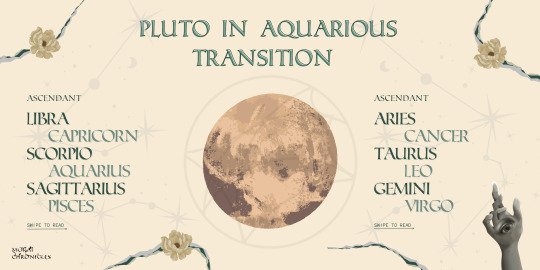
Pay attention to what's happening from the timespan 3/23 - 6/11. Pluto is in Aquarius for now but will move back and have a retrograde in Capricorn afterward. This change would cause a stunt for those making efforts to change while Pluto is in Aquarius.
We can’t change within the span of three months, of course, but during this period, it will give us an overview of what will be happening next on Jan 20, 2024, when Pluto goes back to Aquarius and stays there for 20 years.
This is the dawn of a new era, thus if you pay attention to these three months, you'll then get the scheme of the entire transit in the upcoming 20 years.
Check out your ascendant sign in this Pluto in Aquarius Transition!
Aries Rising: Pluto moves to your eleventh house. Pluto entering your 11th house suggests issues and uprising problems with other people, especially in groups. You may start to feel like an outcast in your friend groups or counter some misunderstandings with some friends in your circle.
Your theme: Groups, friends, social awareness, humanitarianism, technology, hopes, and wishes, futuristic.
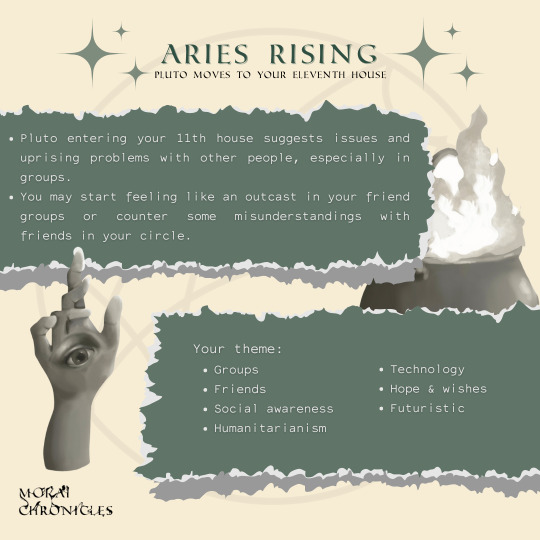
Taurus Rising: Pluto moves to your tenth house. This indicates there might be many career challenges, and will force you to create a more authentic public image based on the job that truly suits you. This could also be a hard time for your reputation or your relationship with your father.
Your theme: Career, long-term goals, structure status, reputation, public image, masculinity, father figures, experts, fame.
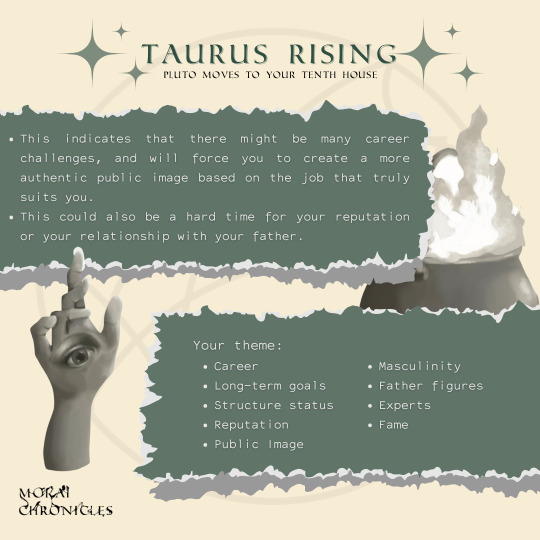
Gemini Rising: Pluto moves to your ninth house. In a three-month span, you might encounter people, ideas, and places that will challenge your view on life. You may also struggle with philosophical/ethical questions.
Your theme: Travel, wisdom, philosophy, higher education, law and religion, cross-cultural relations, learning, ethics.

Cancer Rising: Pluto moves to your eighth house. You’re more prone to taboos and mysteries, though this might create trouble for you. You will encounter issues around shared resources, debts, taxes, sex, death, and birth.
Your theme: Merging, sex, intimacy, shared finances, inheritances, taxes, loans, assets, property joint ventures/goals, mystery, and partner’s resources.
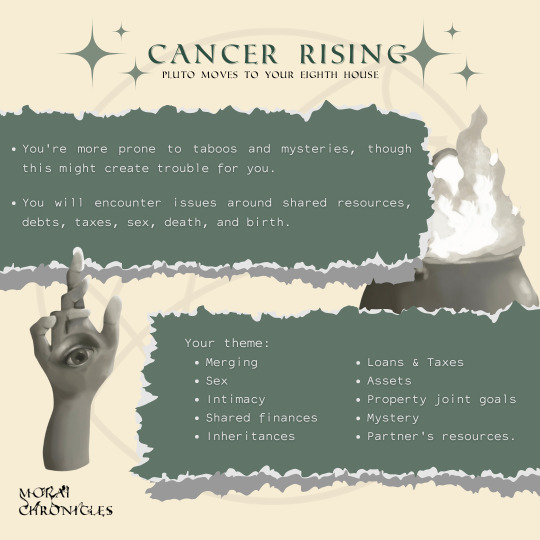
Leo Rising: Pluto moves to your seventh house. In this period, you might start to realize something about your relationships, maybe underlying problems, the equality and power dynamics in the relationship. You might also have to face deeper layers of yourself and your weak points when dealing with one on one relationships.
Your theme: Relationships, marriage, contracts, business partners, equality, sharing, interpersonal style.
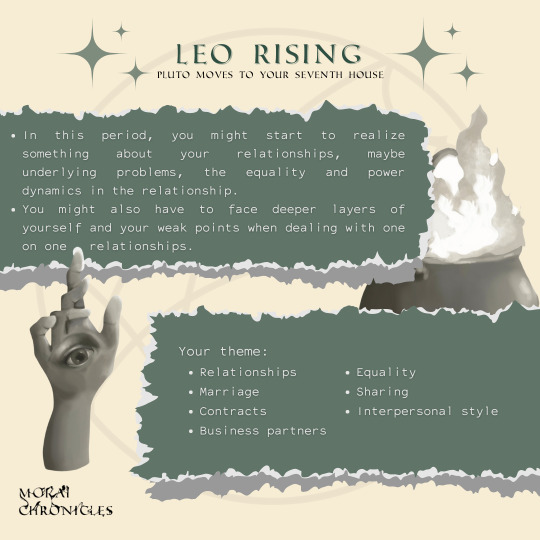
Virgo Rising: Pluto moves to your sixth house. You can pay more attention to building structure for your health and fitness. Create a schedule, create habits, create lifestyles. This is the time to think of habits that no longer serve you and get rid of them.
Your theme: Health, fitness, systems, analytical nature, pets, work habits, organization, sense of usefulness, service given.

Libra Rising: Pluto moves to your fifth house. You are advised to learn or relearn a creative hobby. Be playful, engage yourself in love affairs and romance, let your inner child be released, and let him/her/them play out their fantasy. Pay attention to your self-expression. There might be drama in your love stories and challenging aspects of your love life.
Your theme: Romance, love affairs, play, creativity, fertility, childlike spirit, joy, self-expression, drama.
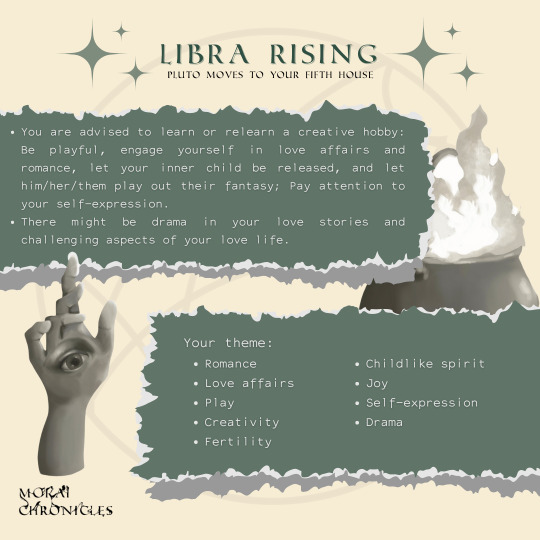
Scorpio Rising: Pluto moves to your fourth house. It’s a wonderful time for you to retreat to your childhood memories by visiting your hometown, and spending time with your family and people you considered home. It’s impossible to move to the future without acknowledging your past. As your sense of roots and emotional foundation solidifies, the path to your future widens. There might be obstacles along the way, but embrace your past and your femininity side, and do extensive self-care.
Your theme: Home, roots, family, self-care, emotions foundations, mother figures, children, women, femininity
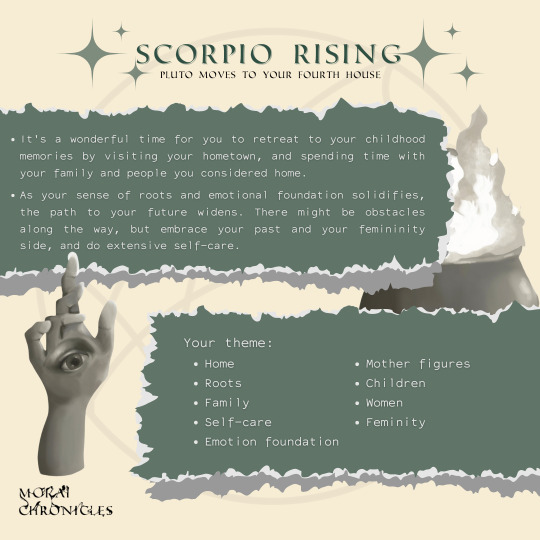
Sagittarius Rising: Pluto moves to your third house. Reflect on how you study and see if it’s time to try out new things, whether it’s how you study, how you organize your study place, or new interests emerging. There might be obstacles in how you think, how you communicate, or even your relationship with siblings/neighbors with encountering arguments.
Your theme: The mind/thinking, communication, siblings, social activity/interests, neighbors, early education.
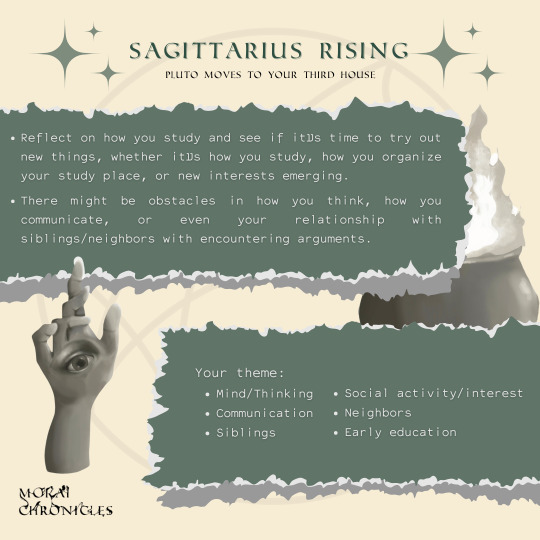
Capricorn Rising: Pluto moves to your second house. Look for your unique talents to monetize them. It’s time to reflect on yourself, your work, and your money flow. You will mainly focus on work and overcoming challenges about assets.
Your theme: Money, work, income, daily routines, values, material possessions priorities, habits, your job, and work ethics.
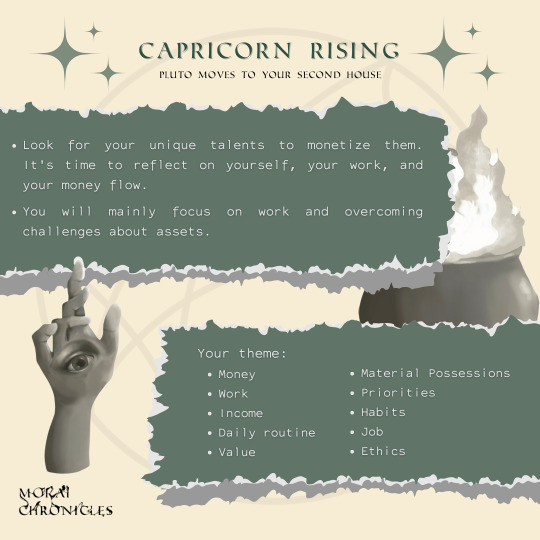
Aquarius Rising: Pluto moves to your first house. Identity crisis and the death of your old self is the theme surrounding this three-month transformation. You will undergo a process where your body, your appearance, and your approach to life will be in crisis. Only then will it can be changed completely. Note: It’s a great time if you’re planning to change your outer appearance. Do it in this period.
Your theme: Self, appearances, beginnings, the body, first impressions, attitude, identity, approach to life.
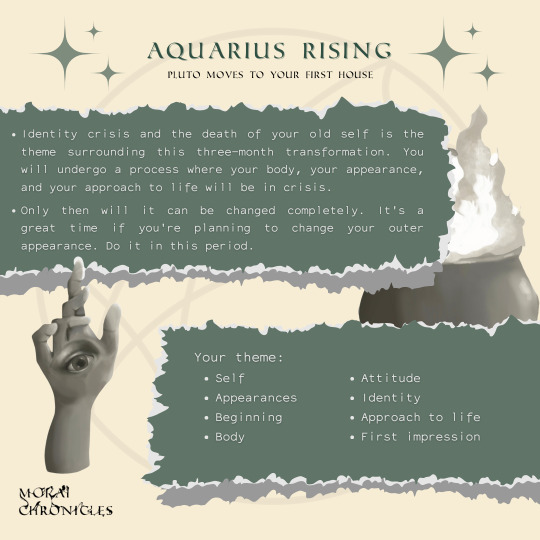
Pisces Rising: Pluto moves to your twelfth house. It’s your ending chapter now. A lot of new things are happening and Pisces Risings are under a lot of pressure lately. It’s vital time your wounds healed before something new can appear. Indulge in spirituality, and meditation, ask for closures, and say sorry to those you hurt in the past. This is indeed a harsh time, but also a time of rebirth.
Your theme: Endings, healing, closure, spirituality, solitude, karma, old age, afterlife, what’s hidden, limiting beliefs, subconscious.
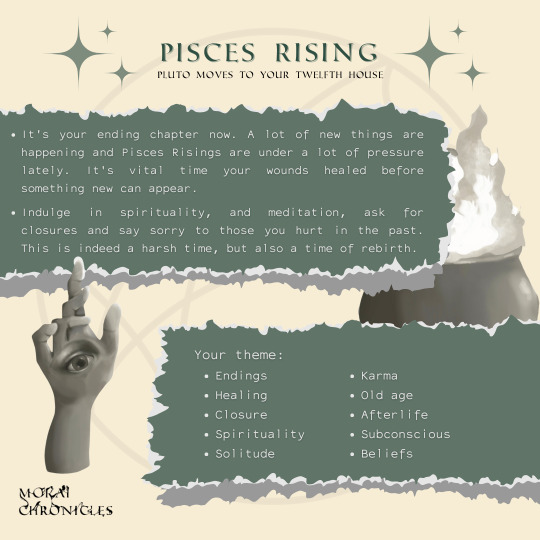
For more information, check out The Moirai Chronicles.
#astrology#astronomy#witchcraft#tarot#occult#pluto astrology#zodiac#zodiac signs#aries rising#taurus#aquarius#scorpio#gemini#libra#pisces#capricorn#sagittarius#virgo#aries#cancer#leo
18 notes
·
View notes
Text
y’know, besides the real issues of new teacher burnout in the first few years of teaching, and the behaviour of BOTH parents and kids towards teachers today and obvs the overload of admin and poor pay…. i think the reason so many early career teachers are leaving the profession is because it’s often made to seem as the ONLY career path for each and every liberal arts/arts major; no matter whether you’re an english student or religion or sociology or philosophy etc etc etc major.
because i know i’ve talked about a fuck tonne in the past, but the one thing i absolutely LOATHED about job fairs at uni and, in the end, just the careers department at uni, was that the only field they could suggest to me as an english lit and philosophy student/graduate, was teaching. apparently with english, with good language and critical analysis/thinking skills, i wasn’t appropriate for other fields like marketing (despite my marketing diploma), advertising, media/communications/PR…. even though yes i did begin in that actual degree…. but i found it far too structured (mostly bc i picked my TRIPLE major way too early) to my liking; and that STUDYING media/comms/PR etc etc whatever the fuck the major called, i realised halfway through first year that the study of the field itself wasn’t for me…. but that i could probably work in it still.
but the problem with job fairs, every time i went up to a booth that wasn’t specifically aimed at arts students (bc we all know every workplace has a media and communications dept don’t we????) i was automatically almost sneered at by the carrier booth people and told to “go over to the teaching booth, they’re over there 👉”. “but i want to work in your advertising/marketing dept” “too bad. you should’ve picked media & comms or an ACTUAL commerce/business marketing degree 🙄🙄. now, run along to the Teach For Australia booth, they’ll hire you in no time!” ok. so. maybe i was wasting some of these people’s time, yes: obvs particularly law and engineering. but that doesn’t mean i should’ve been automatically booted away from their career fair stall, and basically automatically directed to the teaching booth; just for the fact that i picked to study english. also most esp the stalls where the company is all like “we hire ALL degree streams 😊!!”; and then they still boot you away bc you didn’t pick the apparently or inherently “correct” arts dept field (eg. media & comms).
because what i imagine is that so many of the early career teachers that are quitting (not counting burn out etc), are quitting because they were part of the sea of arts students who got sick and tired of everyone suggesting teaching as their ONLY viable career path because “you love english!!! teaching is a way to make money!” or whatever the fuck dumb bullshit people say to convince people to do teaching as a career. so what did they do??? they went into teaching. maybe they did like it, in the masters course or whatever. maybe they did genuinely feel like they were helping kids with writing and promoting a love of reading in their classes; and a range of other motivations that i’ve read in recent news articles about this issue.
but over time, and with the myriad of other reasons that are obvs more tangible (burnout, pay, copious amounts of admin, lesson planning even taking up your holiday time, behaviour of both students and parents etc etc)…. i imagine the people who felt like they were forced to pick teaching as a career path because of their chosen arts major field/s, are feeling even worse about their careers as teachers…. and are feeling just as (if not more) burnt out as the people who actually love their choice to go into teaching. (although i do acknowledge that people who love their job as a teacher are also suffering from major burnout and anxiety and stuff around their job as well).
anyway. this post is just me saying that i’m glad that i didn’t pick teaching; despite being told it was apparently my ONLY VIABLE choice of career, due to doing english. bc tbh, it’s because i fucking well KNEW i’d be one of the resentful teachers that every kid would hate; because it was my only forced choice of career that everyone told me was a smart move- when it’s not actually one of those “cushy ass” jobs, that most people always love to paint teaching as. it’s hard. it’s tiring. it’s mentally and emotionally draining/challenging. and now with it being paired with constant uncertainty of contracts not being stable/long term or just being stuck on a casual/part time basis for most of your life as a teacher….. it’s just not worth the stress/anxiety et al, all because “you studied arts, so you HAVE to be a teacher!”
10 notes
·
View notes
Text
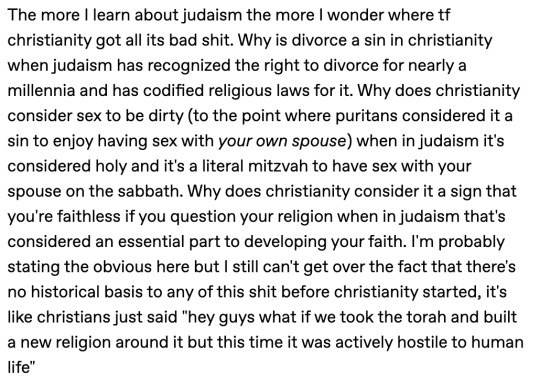
im sorry i couldn't let this go, i've seen this come across my dashboard THREE TIMES NOW and you all need to grow some critical thinking skills, please, i am begging you...anyway i just screenshotted this cause i really don't wanna get into it with anyone but this is the stupidest most ignorant thing i've read regarding religion in a long ass time.
placing this under a cut to be polite and save everyone's dashboards - I'm a Jew who converted to Christianity, so i guess my Jewish desire to be polite and considerate managed to override my christian religious mandate to be an asshole on this day...you're welcome everyone
first of all, judaism is a culture and faith that is six thousand years old, and christianity is two thousand years old, and both have spanned entire continents, so it is impossible for any quick rambly tumblr post to be able to remotely capture the reality and nuances of either one.
for example! claiming that in "judaism," divorce is totally accepted and acknowledged and women are free to just up and leave their man and it's some kind of feminist utopia is laughably bullshit! structures of patriarchal oppression use Jewish divorce law to control women - there's even a word, agunah, which means "chained woman." there are currently, as you read this, Jewish women in America who are trapped in this system, and it often leads to all sorts of violence and other nonsense!
also...the story of Leah and Rachel and Jacob is part of Jewish scripture and it isn't exactly a "rah rah women aren't men's property" moment, is it? it's almost like this is a complex subject with lots of nuance!
what about christianity? this brilliant theological scholar claims that divorce is a sin in christianity, just, flat out, period, end of sentence. it's good and allowed in judaism but bad and forbidden in christianity. is that true? of course not!!! most contemporary branches of christianity currently recognize divorce and accept divorced members in their congregation. Jesus is cited multiple times in the Gospels making statements about marriage and divorce that are, let's say...open to interpretation (see Matthew 5, Matthew 19, John 4). hell, we have an entire branch of christianity that partly started because some dude really, really wanted to divorce his wife.
so it makes no sense to say that judaism is totes cool with divorce but christianity is super mean about it. in reality, both religions have believers who use their laws/traditions to oppress women and uphold patriarchal structures, and followers of both religions have found their way to more progressive understandings of marriage and divorce.
also, love the citation of "puritans" as an example of what "christianity" is. puritanism was a small, radical offshoot of christianity - they were run out of entire countries, as you may remember, for being weird and extra about stuff. plus puritanism only appeared in the 1500s, so christianity had been bopping around developing some other theology for a while until then. and while much of american christianity can be traced back to puritan roots, you won't exactly find many practicing "puritans" running around in the 21st century.
so using "puritans" as the platonic example of What Christianity Is just makes no historical sense. if you want to talk about puritan ideas, go ahead. if you want to compare puritan thought to a specific era or sect of Jewish thought, that would be interesting! but you can't just say "some dudes in the 1600s did stuff, and that's what all christians do and believe"
it is also absurd to claim that christian faith makes no room for questioning. again, this person seems to be either citing very specific contemporary evangelical attitudes, or ahistorical caricatures, as a broad strokes representation of a 2000 year old, global religion. in fact, there's been a LOT of excellent christian thought and writing about wrestling with God, struggling with doubt, and asking questions. don't believe me? check out this overview in a popular contemporary christian publication.
also, it's silly to say that asking questions or challenging one's faith is 100% encouraged and accepted at all times "in judaism." google "off the derech" or check out some of these sources. Neither christianity or judaism, as a whole, is a pure perfect innocent cinnamon roll uwu of a religion.
the thing is that people use religion and religious institutions for their own purposes. power, wealth, control, etc. they will use the one most convenient and relevant to their purposes. it is not a feature unique to christianity.
and i can't even TOUCH that last bit. the notion that everything we find yucky about various historical iterations of christianity were nowhere until a bunch of jesus freaks just thought them up? what??? the idea that the entirety of christian thought and belief came about because some Very Nasty People just woke up one day and decided to be cruel and destructive? are you for real???
that's not...how things work. that's not how anything works. you are not "stating the obvious" because you are making such an absurdly false statement that it just...have you ever read, like, a book?
the history of western christianity is thousands of years long, and it includes hundreds of different influences, from plague epidemics to corrupt rulers, and there have always been a ton of people writing, thinking, talking, and arguing about what it means to follow Jesus.
there is a LOT of christian thought and history that does exactly what this person claims never happens in christianity - celebrates the body, honors the dignity of every person, upholds joy and pleasure as sacred, etc. OP i think is referring to the ideas of thomas aquinas who was JUST ONE DUDE in the 1200s and does not represent everything that every christian has ever believed, done, or taught. check out the writings of St. Teresa of Avila, Gerard Manley Hopkins, or Julian of Norwich.
there are some christian practices and beliefs that arose from people's good faith efforts to follow a loving God. there are some that arose from people in power trying to cling to their own privilege. and most of them come from a combination of both! guess what - this is also true of judaism! turns out, both christianity AND judaism have really messy, complicated, nuanced backgrounds! one is not just a bunch of people saying Let's All Be Cool And Make The World Nice And Good vs. a competing bunch of people going Let's All Be Dicks And Ruin Everything. that makes no sense! think about the things that you are saying!!!
if you're curious about this, or if you want to be able to have a more nuanced opinion about whatever you think "christianity" is, i'd recommend a book called Christianity, Social Tolerance, and Homosexuality. It's a great place to start for an in depth, heavily sourced study of exactly how christian thought about a specific issue changed, developed, and solidified. there, you'll see that there is no way to summarize what "christianity" does, believes, or says, because it's wide ranging and ever changing. you'll also see that certain problematic attitudes or beliefs don't just spring up because Christians Are Assholes, but because of competing pressures and influences from inside and outside the church.
if you want a free copy of that book, PM me and I will send you one. seriously. even if you hate christianity, had terrible personal experiences with a contemporary church, etc. it's a great read. there are sexy love letters between gay monks. im serious.
7 notes
·
View notes
Text
Do you ever see a post where just... literally everything is wrong?

The Law of Gravitation originated with Isaac Newton, and is a law, not a theory. This seems to be confusing the concept of gravity with Einstein's Theory of Relativity.
And an important point about scientific theories is that they are regularly modified as new evidence arises. They are not static. They are not meant to be treated as religion and followed on blind faith alone, and need to be rigorously tested and retested.

That... doesn't actually make sense, and I don't know why anti-endos keep repeating it.
Traumatizing children could prove that trauma can cause OSDD and DID. It could NOT prove that only trauma can cause DID/OSDD. Not every instance of dissociation is from trauma. The goal shouldn't be to prove that trauma dissociation can cause someone to develop plurality. The goal should be to prove that other nonpathological forms of dissociations can't.
Traumatizing children wouldn't do this. It could establish a causal link between trauma and dissociative disorders instead of just a correlation, but that's it. You can't debunk endogenic plurality by establishing this link. It's like trying to milk a goat to prove that you can't milk a cow.
One thing that would be useful for supporting the ToSD is to study trauma history in OSDD-1 patients more closely. Specifically, breaking them into categories of those with and without amnesia to compare the groups to each other and to DID systems.
But such studies have not been conducted, and psychiatry continues to largely ignore OSDD-1 patients or just lump them all together regardless of the presentation of their symptoms.
But also, let's look again at what the psychologists who created the Theory of Structural Dissociation actually have said:
Our definition of dissociation pertains to a division of the personality in the context of trauma. We are aware that this division may also occur in hypnosis and mediumship, that several other definitions of dissociation also address these other contexts, and that there are some indications that dissociation in these other contexts is also best understood as a division of personality. For example, Hilgard’s well-known “hidden observer,” as found in some highly hypnotizable subjects, involves a dissociative part of the personality that is endowed with consciousness and self-consciousness, but the phenomenon is disputed (e.g., Kihlstrom, 1998; Kirsch & Lynn, 1998). Mediumship may involve conscious and self-conscious dissociative parts of the personality (Braude, 1995). However, dissociation in mediums is in several regards different from dissociation in DID (Moreira-Almeida, Neto, & Cardeña, 2008). The possible involvement of consciousness and self-consciousness in dissociated controls in hypnosis and in dissociative parts in mediumship needs to be examined in more detail before a conclusive general definition of dissociation can be formulated.
In this, they acknowledge that mediumship may be a result of a division of the personality that may be self-conscious, stemming from dissociation.
While they note that it's different, they are acknowledging the existence, or at least the possibility, of endogenic plurality.
And I'm certain that now, if the person who was just calling other people stubborn for not believing psychologists sees this, they're going to instantly have a change of heart and acknowledge the actual viewpoint of psychologists. /s
Or, more likely, they'll just call the founders of the theory of structural dissociation ableist for contradicting the theory of structural dissociation. Yeah, that seems more right. 🙄
10 notes
·
View notes